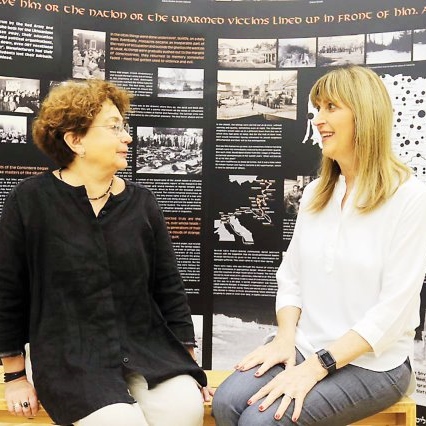click to dowload our latest edition
CLICK HERE TO SUBSCRIBE TO OUR NEWSLETTER


Published
5 years agoon
By
adminMIRAH LANGER
“We spend a lot of effort in reminding the people living in Lithuania who the Jews are, because in half of our country, there are no Jews at all.” So says Faina Kukliansky, the chairperson of the Lithuanian Jewish community, during a recent visit to Johannesburg.
Kukliansky, a lawyer who has served as both a criminal investigator and prosecutor, was visiting to mark the opening of a new exhibition on the history of Lithuanian Jewry at the Johannesburg Holocaust & Genocide Centre in Forest Town. She also held a separate question and answer session to interact with the South African Litvak (Lithuanian) community.
Kukliansky sketched a complex portrait of contemporary Jewish life in Lithuania. She described how the community tasked itself with preserving its heritage, seeking justice for war crimes, fighting anti-Semitism, as well as bringing up the next generation according to Jewish values.
“We take a lot of care of our heritage – our synagogues, civil society, cemeteries, and the places where mass murders took place.”
She said the community was involved in preserving about 250 cemeteries, and a similar number of sites of mass murder.
About 60% of the community is elderly. Nevertheless, the community is proud of its Jewish school in Vilnius, where Hebrew is taught from Grade 1 to Grade 12.
Kukliansky said the community was very politically active, citing the recent case of the Noreika plaque. In this case, South African-born Grant Gochin took the Lithuanian government to court to get it to take down a plaque outside a library in the capital city, Vilnius, which honours Lithuanian nationalist hero Jonas Noreika. This man was responsible for the murder of 14 500 Lithuanian Jews in 1941, including one hundred of Gochin’s relatives.
Gochin’s aim – along with the likes of Kukliansky – is to get Lithuanian government to recognise that many of its political and military leaders played an active role in the extermination of the country’s Jews during the Nazi era.
Before World War II, the Lithuanian Jewish population numbered about 160 000 people. About 90% of this population was subsequently exterminated.
Since Lithuania became independent in 1990, the community has also been involved in seeking restitution for private property lost during World War II and the subsequent Soviet regime. It is a process riddled with legal hurdles, yet, Kukliansky said the community remained determined to keep trying.
The community had been paid restitution for communal property that was seized. The money was put in a community fund, and is distributed to help 1 500 community members.
Kuklianski conceded that the community was “always afraid of anti-Semitism”, but said it was also vigilant in fighting it. Most often, this was done by education.
She said the only formal event in Lithuania that appears to have direct links to anti-Semitism is a yearly skinhead march. “They say that Lithuania is only for Lithuanians. I’m not sure that they know what they are talking about.”
Asked by an audience member whether she thought there was danger for the Jewish community in the future, Kukliansky said that it was impossible to dismiss this fear.
“This is not ended. It is not finished. If [certain] Lithuanians would start to make the same concerted [push against the Jews], I think a lot of Lithuanians would join them. People, sometimes they lose their minds. They believe [myths about the Jews].”
Nevertheless, Kukliansky said with a touch of dark humour, when people tell her that Jews rule the world, she always responds, “Yes!’”
Kukliansky said that the Lithuanian Jewish community was looking forward to 2020. The Lithuanian parliament has deemed next year to be a commemoration of the Vilna Gaon, the famous Lithuanian Jewish religious leader, Rabbi Elijah ben Solomon Zalman, and the history of the Jews in Lithuania. That year will mark 300 years since the birth of the Vilna Gaon.
Lithuanian Ambassador Sigutė Jakštonytė, who also attended the opening, made it clear that the country wanted to honour its relationship with Jewry through initiatives like the events planned for 2020.
“There have been joyful and painful moments,” she said of the centuries of Jewish life in Lithuania. “We have to remember all of them and learn from them. The 20th century brought great pain and suffering to the Jewish community of Lithuania, and nothing can make us forget the innocent victims of the Holocaust.”
The ambassador’s acknowledgement of this painful past made 92-year-old Mord Perlov, a Lithuanian Jewish survivor of the Russian gulags, emotional.
Standing up at the event, he declared that Jakštonytė had given him a sense of spiritual home coming.
